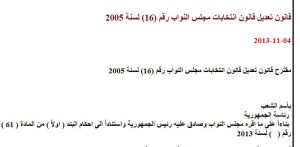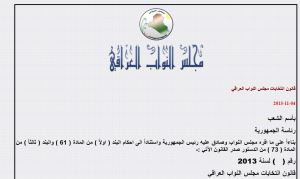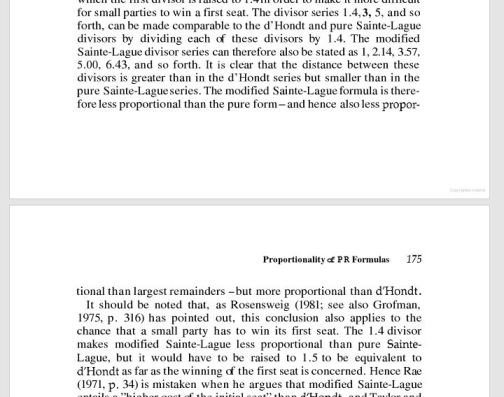After the Passage of Changes to the Iraqi Electoral System, Uncertainty about Their Legal Status
Posted by Reidar Visser on Monday, 11 November 2013 18:33
Ever since the Iraqi parliament passed changes to the Iraqi electoral system on 4 November, doubt regarding the exact status of the action by parliament has lingered. In theory, the legal uncertainties concerning the nature of the piece of legislation passed by the government are such that parliamentary elections – now scheduled for late April 2014 – may be postponed or even canceled in a worst case scenario.
A juxtaposition of two snippets from the Iraqi parliamentary website – one on the day of the passage of the changes, and another featuring the website as it is today – highlight some of these ambiguities. On the day the law was passed, parliament published a legal text with the headline “law proposal for the revision of the electoral law no. 16 of 2005”. Conversely, today the headline for the same law simply reads, “election law for the Iraqi national assembly”. The more recent version of the document is helpful in sorting out some contradictions that were present on the day the law was issued. In particular, it seemed strange to call the legislative act an amendment of the existing law, since article no. 47 of the newly passed piece of legislation specifically abrogated the law from 2005! But whereas semantics may be to blame in that respect, the distinction between a “law proposal” and a standard law is not so easily resolved. That is so because over the past couple of years, the Iraqi supreme court has developed something of a pet issue regarding the exclusive right of the executive power in Iraq – the cabinet and the president – to introduce legislative projects to parliament. An independent right of parliament to initiate legislation is not recognized, and the court has consistently struck down as unconstitutional all “law proposals” that have been brought to its attention, always citing article 60 of the Iraqi constitution.
It seems clear from all accounts that the new Iraqi electoral law that was passed last week was indeed a mere “proposal”. It reportedly originated from the legal committee in parliament. As such, it has not passed through the executive power, and it would be perfectly analogous and compatible with past precedent to have the law struck down as unconstitutional by the supreme court if anyone complained.
Crucially, such a formal complaint now reportedly exists. It has been reported that an exiled Iraqi named Ayyad al-Bazi has submitted a complaint to the supreme court, precisely on the grounds that the new law is a mere proposal and therefore unconstitutional according to the court’s own jurisprudence.
One must also wonder how the Iraqi communist party, who started the drive towards a more proportional system through a complaint to the supreme court, feels about all this. There has been much confusion about the new changes, with some alarmist reports out of the United States suggesting that the threshold for representation has gone up dramatically. This is not the case: There is no longer any “electoral divider” (qasim intikhabi) by which total votes are divided by seats available in each governorate to set an official cut-off point for representation. That was an aspect of the largest remainder method that no longer comes into play. However, simulations of the 2010 results strongly suggest that the communist party would remain unrepresented under the new system as well. Indeed, Arend Lijphart, an internationally recognized expert on democratic theory and electoral systems, considers modified Sainte Lague with a divisor 0f 1,4 less proportional than largest remainder, meaning that Iraq with its even bigger divisor of 1.6 has moved even further away from the proportionality of the original system.
The communist party could thus legitimately complain to the supreme court again, since the new legislation has done little to address their claims and possibly has made for a worse situation from the proportionality point of view. Rather than changing the formula, the key to better proportionality would probably be either more national seats or a single constituency – the latter is mostly rejected by Iraqi parties because of its other disadvantages. In any case, now that Mr. Ayyad al-Bazi’s appeal has been lodged with the federal supreme court, something is there that can potentially be used to cancel or delay the elections, or be used as a means of pressure by those who are less eager to hold elections than others. On the surface, then, Iraq seems on track to polling in late April, with a deadline for political entity registration set for next week. Once more, though, Iraq’s supreme court could become embroiled in politics, and its track record of staying above Iraqi factionalism has not been a terribly good one during the past few years.




No comments:
Post a Comment